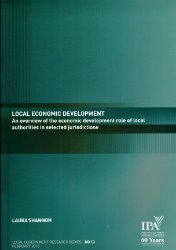Local Government Research
Quantity must be non negative number
This case study report explores innovations implemented by Housing Departments in several local authorities. The selected case studies are examples of new or amended practices, adopted as part of the day-to-day work of the Housing Departments concerned. They display varying levels of innovation and impact. Each example is explored in terms of its development, implementation and outcomes. Lessons learned from the process are also described and consideration is given to future plans.
Download
pdf file (1418 kb)
As the response to Covid-19 evolved throughout 2020 local authorities rapidly adapted and demonstrated innovation across a number of areas. This research aims to highlight and support this response by both sharing information and learning from across Ireland and internationally, and informing longer-term practice and policymaking.
Five main themes were identified from this research, which cover broad areas of the local government response to Covid-19:
• Maintaining service delivery and business continuity.
• Coordinating community supports.
• Reopening society and supporting local economies.
• Operating in a system of multi-level governance.
• Maintaining local democracy.
Download
pdf file (460 kb)
Prior to the LGMA assuming responsibility for capturing data on national customer satisfaction, the County and City Management Association (CCMA) asked the Institute of Public Administration to conduct a research study into measuring customer satisfaction, to draw lessons from national and international good practice. The study encompasses both national customer satisfaction initiatives and also what might be done at local authority level.
Download
pdf file (1181 kb)
Putting People First: Action Programme for Effective Local Government (Government of Ireland, 2012) resulted in significant changes in local government. Many of the reforms set out in Putting People First were introduced with effect from 1 June 2014 under the Local Government Reform Act 2014. Amongst the reforms was the dissolution of 80 town councils, a reduction in the number of elected members from 1,627 to 949, and the establishment of 95 municipal districts. The number of municipal districts increased to 100 following the local elections in 2019.
Despite being in existence for several years now, little has been written about the operation and role of municipal districts. This study examines how municipal districts are operating in practice, looks at their strengths and limitations as an element of local government, and highlights opportunities and challenges for the operation of municipal districts in the future.
Download
pdf file (1534 kb)
Effective approaches for knowledge management and knowledge sharing do not come easily to government at either local or national levels. As Sinclair (2006, p.14) comments, ‘knowledge management is counterintuitive in relation to how government organisations have traditionally functioned. The average government office functions through a strict adherence to policies, rules and hierarchy – not at all how knowledge management tends to work’. Added to this, knowledge management is sometimes perceived as elitist or impractical, adopted as a management fad by private sector multinational corporations, but unsuitable and impractical in the public sector.
Download
pdf file (1000 kb)
The need to involve citizens in decision-making is an issue faced by governments, both central and local, globally. This research draws on extensive national and international literature, case studies, policies, guidance and principles of engagement, as well as other research recently carried out by the Institute of Public Administration (IPA) research team.
Five in-depth case studies are presented to demonstrate best practice across IAP2's spectrum of citizen engagement. The purpose of the spectrum is to demonstrate the different levels of participation, from informing or consulting citizens to involving them in decision-making, collaborating with them and empowering them. This spectrum was used to identify best practice and case studies that reflect the diverse initiatives at local level in Ireland which aim to enhance outcomes through better informing and engaging with the public.
Emerging trends and some practical recommendations for local authorities are outlined, aiming to aid local authorities in maximising the impact of their citizen engagement initiatives
Download
pdf file (832 kb)
Enhancing engagement with citizens is at the forefront of our public services at both local and national level. Local authorities are no strangers to citizen engagement, but there is always scope to explore new ways of working and ways to enhance existing processes in order to provide the best possible outcomes for citizens. At the national level, Ireland’s Open Government Partnership (OGP) National Action Plan 2016-2018 commits to increased citizen engagement to improve policies and service delivery.1 One commitment under this plan is to undertake a feasibility study on possible means of enabling further citizen engagement in local authority budgetary processes. This report was commissioned by the Department of Housing, Planning and Local Government, the lead implementing organisation for the commitment, with the support of the County and City Management Association (CCMA) and the Association of Irish Local Government (AILG).
Download
pdf file (739 kb)
This report provides a case study of Ireland’s Age Friendly Cities and Counties (AFCC) Programme to demonstrate the role of local government as local service coordinator. In line with international trends and a shift towards local networked governance (Rhodes, 1996; Stoker, 1998), local authorities have been given greater responsibility for economic and community development and as a result their role as coordinators of local services is increasing.
This trend is reflected in the vision set out for reform of Ireland’s local government system:
Local government will be the main vehicle of governance and public service at local level - leading economic, social and community development, delivering efficient and good value services, and representing citizens and local communities effectively and accountably (Department of the Environment, Community and Local Government, 2012, p. 1).
Download
pdf file (689 kb)
 This report examines the role of subnational governments in local economic development. The report provides a brief overview of the current situation in Ireland, identifies international trends, and provides examples of the economic development role of local authorities in other jurisdictions. The OECD (2013) defines local economic development as “a cross cutting and integrated activity where the physical development of a place is linked to public service, place management, and wider drivers of change such as employment, skills, investment, enterprise, innovation, productivity, quality of life, and positioning” (p. 9). Local government plays a key leadership role in this kind of local integration.
This report examines the role of subnational governments in local economic development. The report provides a brief overview of the current situation in Ireland, identifies international trends, and provides examples of the economic development role of local authorities in other jurisdictions. The OECD (2013) defines local economic development as “a cross cutting and integrated activity where the physical development of a place is linked to public service, place management, and wider drivers of change such as employment, skills, investment, enterprise, innovation, productivity, quality of life, and positioning” (p. 9). Local government plays a key leadership role in this kind of local integration.
Download
pdf file (747 kb)
 Participatory Budgeting (PB) is a process in which the public can participate directly in the allocation of local public
Participatory Budgeting (PB) is a process in which the public can participate directly in the allocation of local public
finances. Residents develop project proposals for their local area and vote on shortlisted proposals in order to select
winning projects to be implemented in the area.
South Dublin County Council (SDCC) piloted the first ever PB process in Ireland in 2017 (branded “€300k – Have
Your Say”). SDCC allocated €300,000 to the PB process and selected one of 6 local electoral areas in South Dublin
County by lot in which to pilot the project. The area selected was the Lucan electoral area, which also includes
Palmerstown and Adamstown.
160 ideas were generated at the project proposal stage, through a combination of workshops and online submission
of ideas. These were eventually whittled down to 17 projects which went out for ballot. Over 2,500 ballots were cast
online and in person, and 8 winning projects selected:
- Playground in Waterstown Park, Palmerstown
- Feasibility Study for the Restoration of Silver Bridge, Palmerstown
- Christmas Lights in Lucan Village
- Planting Native Apple Trees, Lucan Electoral Area
- Access to Church and Graveyard at Mill Lane, Palmerstown
- Free Library Book Banks in Public Places – Lucan Electoral Area
- Multi-Games Wall in Lucan
- Restoration of King John’s Bridge Griffeen Park – Lucan
The South Dublin County Council “€300k – Have Your Say” PB exercise has been a success and proved very popular.
This is illustrated by the response to a question in the survey of PB participants as to whether they would like to
see the PB process repeated: 94 per cent said they would, and only 6 per cent were against repeating the process.
This report tracks the PB initiative from its start to the selection of the winning projects. The report highlights what
went well and identifies areas for improvement.
Download
pdf file (761 kb)